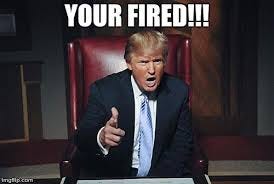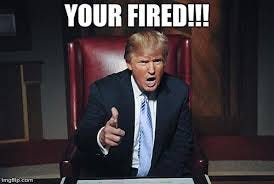You're Fired!
The last two weeks have been a maelstrom of activity involving personnel. The Trump Administration is removing professional prosecutors from their positions and replacing them in an unortodox manner.
Justice Briefs is a weekly newsletter devoted to federal criminal prosecution. The federal government’s evolution over the last 230 years has given federal prosecutors significant discretion. Few realize it exists and even fewer know how it is used. Justice Briefs aims to make federal prosecutions and prosecutors more accessible to the general public. Please help me in this endeavor by subscribing and sharing with others.
Justice in Brief
In the District of Columbia, a former advisor to the Federal Reserve Board was indicted for disclosing confidential Federal Reserve information to members of the Chinese government.
In the Central District of California, two members of a Neo-Nazi organization were charged with producing child sexual abuse videos for online distribution.
In the Middle District of Alabama, a former county jail administrator who oversaw federal pre-trial detention defendants was indicted for assaulting one of the inmates despite the inmate being secured and compliant.
Moving time…
Just two weeks into his second presidency, Donald Trump has created significant waves within the ranks of the Justice Department. In his first week, he fired the prosecutors who worked on the two federal criminal cases against him. He also reassigned many long-serving prosecutors to new positions, particularly those in the National Security Division. Last week, he fired any prosecutor who worked on cases related to the January 6, 2001 prosecutions. In doing so, the Administration provided a similar rationale: the President did not believe that these prosecutors would faithfully carry out the President’s agenda. What is the significance of these personnel actions? Are they unprecedented?
Understanding these actions requires some basic information about federal government employees. During the 19th century, the federal government’s size expanded greatly. This included the federal workforce. The workforce also became more specialized, requiring particular expertise in many positions. Initially, those filling these jobs were loyalists of the party in power. In 1883, the Pendleton Act created a merit-based civil service. Those hired had to pass an examination. Once hired, they could not be removed for partisan political reasons. Like any law, however, there were exceptions. One exception was for attorneys. Consequently, those working for the Justice Department in Washington, D.C. or the United States Attorney offices were exempted from this protection.
During the 1970s, federal prosecutors gained quasi civil service protections. While they are not required to take the civil service exam, they cannot be summarily fired without cause. There is an established process for removing them from their post.
This also established two distinct roles within the Justice Department. One is the “career” prosecutor role. This person goes through a rigorous hiring process. Once they complete a probationary period, they receive the civil service protections. Consequently, they remain in their position for as long as they like. This leads to many people making federal prosecutorial work their career. They remain from administration to administration.
The career role confers two benefits for the Justice Department. First, it provides a measure of expertise. They devote themselves to a particular area of criminal law and learn the intricate details of those offenses. The law and the cases do not change from administration to administration so the government can better screen cases and present cases in court. Second, it provides a measure of consistency. When administrations change, when political parties change, the career prosecutors still review the cases and use the same process. While priorities might change, the same prosecution standards are applied regardless of which political party might control the Departments.
The second role is the political appointee. These are the upper echelon positions within the Justice Department. They include the US Attorneys, Attorney General and the leaders of each division within the Department. The President appoints them and the Senate confirms them. Political appointees change with each new president. Presumably, they have the same political orientation as the president and will implement the President's policy agenda. When difficult or controversial cases arise, political appointees might make the final decision on how to proceed but, for the most part, do little of the day-to-day case processing. Instead, they are responsible for policy choices and implementing those choices.
When the Trump Administration removed the prosecutors who handled the cases against him and the January 6 defendants, he removed career prosecutors. This does not happen. While the political appointees expect to leave with a new president, the career prosecutors are never removed because they handled a particular case.
Prior to the 1970s, United States Attorneys and their assistants generally left office once a new president assumed office. For example, one hundred years ago, in the 1920s, Emory Buckner became the United States Attorney for the Southern District of New York. Buckner, as a Republican and was tradition, required the assistants to join the Republican party. Though a Republican, Buckner was not a partisan. To appease the party, Buckner required new assistants join the Republican party but not take an active part. In 1932, when Franklin Roosevelt became president, all the Republicans left the office. When Republicans returned to the White House in 1952, the new US Attorney for the Southern District of New York observed that political allegiance had become a job requirement and promptly replaced the office with “more qualified” attorneys. This, party affiliation was a prerequisite to become a federal prosecutor.
In its best light, this is what the Trump firings accomplished. It returns the Justice Department to its early twentieth century practice. Those in prosecutorial roles are there because of their party loyalty and with the expectation that they will advance the party agenda.
The problem is tri-fold. The most immediate problem is that the firings violated the prosecutors legal protections. They cannot be summarily fired. The second problem is whether or not the Justice Department will fill those positions. The Trump Administration wants to shrink the federal government’s size. Not hiring replacements will accomplish this and make the Department unable to prosecute as many cases. Third, if the Department does hire replacements, they will ensure those hired will faithfully implement the Trump Administration’s policy. What this looks like could be problematic depending on how the Justice Department proceeds. The Department has already realigned prosecutors to focus on immigration matters. This is a policy choice which each presidential administration can implement. There is another option, however. The Department could implement President Trump’s other law enforcement goal: turning the prosecutorial tables on those who attacked him. Already the US Attorney for the District of Columbia has announced an investigation into the January 6 investigation. Should these new prosecutors be used for this purpose, the Trump Administration has turned the Department into a political weapon, something that is unprecedented in Department history.
At this point, there is much uncertainty about the Department’s direction. It is notable that all of this has occurred prior to Attorney General nominee Pam Bondi’s confirmation. Would she endorsed these moves? Her promises at her confirmation hearing would suggest she would not. Maybe this was done to insulate her from criticism. The firings will generate more controversy than the hirings. The telling sign will be the outcome of the investigation into the January 6 cases and whether that results in criminal charges. Those could be placed squarely at Pam Bondi’s feet.
I hope you enjoyed this issue and that it made you stop and think. I would love to hear any comments, questions, concerns, or criticisms that you have. Leave a comment or send a message! Also, if you enjoyed this or if it challenged your thinking, please subscribe and share with others!



